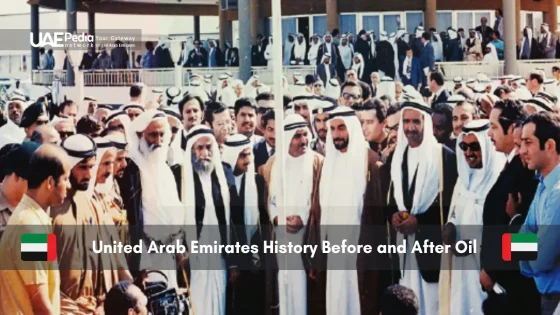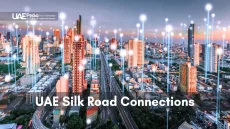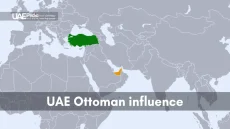What if the UAE’s story isn’t just about glittering skylines and desert dunes? Tucked in Abu Dhabi’s eastern reaches lies a place where ancient falaj irrigation systems still whisper secrets—and date palms outnumber traffic lights.
This Emirati gem began as a life-giving oasis over 4,000 years ago. Bronze Age traders, Bedouin tribes, and modern visionaries shaped its layers—a living timeline where UNESCO-listed stone tombs stand minutes from buzzing date markets. Today, it’s the country’s largest inland city, yet 25% remains protected green space. That’s balance.
Walk its shaded pathways, and you’ll taste saffron-infused karak beside 18th-century mudbrick forts. Modern universities rise near camel souqs, while families from 100+ nations call its garden-lined neighborhoods home. Development here isn’t about erasing the past—it’s building with it.
Quick takeaways:
- Evolved from Bronze Age trading hub to Abu Dhabi’s cultural heartbeat
- Blends 21st-century infrastructure with meticulously preserved heritage sites
- Nicknamed “The Garden City” for its lush, oasis-fed greenery
Unveiling al ain history: Origins and Ancient Beginnings
Ever wonder how civilizations bloomed in Earth’s harshest environments? The answer lies underfoot here—where sand meets ingenuity. This area’s story begins with water warriors who turned arid plains into fertile hubs.
Water Wizards of the Sands
Before skyscrapers, there were date palms. Before concrete, mudbrick homes clustered around life-giving springs. The region’s falaj network—a 3,000-year-old irrigation system—channeled mountain runoff through underground tunnels. Communities thrived where maps showed only emptiness.
“Finding Bronze Age pottery here was like discovering a desert library—each shard tells how they farmed, traded, and survived.”
Time Capsules in the Dunes
Dig sites near Hili reveal jaw-dropping finds:
| Era | Discovery | Significance |
|---|---|---|
| 3200 BCE | Beehive tombs | Complex burial rituals |
| 2500 BCE | Copper tools | Early metalworking |
| 1300 BCE | Date palm fossils | Agricultural evidence |
These oases didn’t just quench thirst—they fueled trade routes linking Mesopotamia to Oman. Camel caravans carried dates, incense, and ideas across dunes. Today’s Abu Dhabi skyline? It all started with these water-wise pioneers.
The Role of the Oasis and Irrigation Systems
Beneath the desert’s golden surface lies an engineering secret older than the Pyramids of Giza. For millennia, communities here turned “impossible” into abundance using gravity-fed water networks—systems so precise they’d make modern hydrologists nod in respect.
Falaj Irrigation and Qanāt Traditions
Picture this: underground tunnels stretching miles, funneling mountain springs to sun-baked soil. The falaj system—adapted from Persian qanāt techniques—required no pumps, just slope calculations carved into memory. Workers dug vertical shafts every 20 meters to clear debris, their shadows acting as ancient sundials to maintain gradient.
“These channels weren’t just plumbing—they were calendars. Water flow told farmers when to plant, harvest, and celebrate.”
Impact on Agriculture and Palm Groves
The numbers stun: one falaj could sustain 8,000 date palms, each tree yielding 100 pounds of fruit yearly. Groves became living supermarkets—dates for food, fronds for roofing, trunks for tools. Even Sheikh Zayed prioritized restoring these systems in the 1960s, knowing they anchored the region’s identity.
- Date varieties like khalas and lulu thrived in mineral-rich soils
- Millet and wheat crops rotated between palm clusters
- Modern UAE farms still use upgraded falaj principles for water efficiency
Today, the soft gurgle of these channels reminds us: innovation here wasn’t about conquering nature—it was dancing with it.
Transformative Era: From Bronze Age to Modern Developments
Beneath the city’s buzz lies a timeline etched in pottery and stone. Archaeologists here don’t just dig dirt—they decode how entire civilizations pivoted. Bronze Age arrowheads rest in museum cases, their edges still sharp enough to slice through time.
Bronze and Iron Age Artifacts
Workers laying pipes in 1998 struck something harder than bedrock: a 4,000-year-old tomb filled with ceramic vessels. These finds revealed a society mastering metallurgy while trading with Mesopotamia. Iron Age jewelry later uncovered—twisted gold threads thinner than eyelashes—showed artistic leaps fueled by oasis prosperity.
Cultural Shifts Over Millennia
As trade routes expanded, so did ideas. Mudbrick homes gained ornate carvings. Date-palm motifs appeared on everything from tools to textiles. “You can trace entire dynasties through pottery glazes here,” notes Dr. Omar Khalid, curator at Al Ain National Museum. The falaj system’s enduring design became a UNESCO blueprint for sustainable water management.
Today, glass skyscrapers reflect the same ingenuity that once channeled mountain springs. Those ancient grooves in clay tablets? They’re echoed in the city’s modern calligraphy festivals—proof that innovation here isn’t new, just reinvented.
Sheikh Zayed’s Legacy and Leadership in Al Ain
Imagine a leader whose childhood playground was an ancient oasis. Sheikh Zayed bin Sultan Al Nahyan grew up amid rustling date palms and crumbling mud walls—a boy who’d later reshape this desert crossroads into a living bridge between eras. His early years at Qasr Al Muwaiji, a 19th-century fort surrounded by orchards, taught him two truths: water sustains life, but vision sustains culture.
The Early Years in the Oasis
Long before skyscrapers, young Zayed navigated falaj channels like neighborhood streets. Locals still share stories of him questioning elders about irrigation techniques—a curiosity that became policy. By his 20s, he’d transformed dusty settlements into thriving hubs. Schools rose beside date markets. Hospitals replaced camel-carried medicine. Yet amid progress, he insisted: “A people without heritage are like trees without roots.”
Modernization and Heritage Preservation
Sheikh Zayed’s genius lay in balance. He ordered the restoration of crumbling forts while commissioning modern buildings with traditional wind towers. Under his watch, Al Ain became a place where families from 40 nations could feel at home, united by respect for the past. The UNESCO-listed Hili tombs gained protective status, even as highways connected the city to Abu Dhabi.
“He’d point to a 500-year-old well and say, ‘This isn’t archaeology—it’s our neighbor.’ His leadership made heritage feel alive, not frozen.”
Today, his legacy thrives in shaded courtyards where kids play near centuries-old watchtowers. The desert blooms with universities and museums, each project whispering his creed: build boldly, but build with.
Fortifications, Museums, and Heritage Sites
Time travel doesn’t require a DeLorean here—just step into Al Jahili Fort’s shadow. This 19th-century sentinel stands as a sandstone storybook, its walls echoing with tales of pearl traders and Bedouin poets. Across the city, UNESCO World Heritage sites blend with interactive museums, proving preservation isn’t about freezing time—it’s rewinding and hitting play.
Restored Fortresses and Al Jahili Fort
Sheikh Zayed bin Sultan once called Al Jahili “a compass pointing to our roots.” His words guided its 2007-2008 restoration, where craftsmen mixed modern concrete with palm-trunk ceilings—exactly as their ancestors did. Today, you’ll find photo exhibits celebrating British explorer Wilfred Thesiger alongside touchscreens detailing the fort’s role in date trade protection.
“Restoring these walls wasn’t archaeology—it was therapy. Every stone laid connects a Gen Z student to their great-grandfather’s struggles.”
World Heritage Recognition and Museums
When UNESCO World Heritage status arrived in 2011, it validated what locals knew: this desert jewel holds humanity’s shared memory. The Al Ain Palace Museum—once Sheikh Zayed’s residence—displays his personal Qur’an beside VR headsets that recreate 1960s oasis life. Key stats tell the story:
- 6 cultural sites included in UNESCO’s designation
- 22,000 artifacts digitized for global access
- 47% of visitors under 35—proof history breathes here
Mornings here might start with coffee near a 500-year-old watchtower, afternoons exploring holographic date market reenactments. It’s not just about saving the past—it’s making sure the past still talks.
Cultural and Commercial Evolution in the UAE Region
Step into a market where the scent of frankincense mingles with fresh espresso—this is where the UAE’s heartbeat thrums loudest. Traditional souqs and chrome-plated malls don’t compete here—they collaborate, creating a rhythm that’s equal parts heritage and hustle.
Traditional Souqs and Modern Shopping Centres
At Al Ain Souq, vendors still weigh dates in brass scales while chatting about TikTok trends. A few miles east, the glass-domed Bawadi Mall hosts pop-up exhibits about Bronze Age trade routes. “We’re not choosing between past and present,” says Layla Al-Mazrouei, a third-generation spice merchant. “My stall sells za’atar blends my grandmother made—right beside vegan camel-milk chocolate.”
Economic Growth and Regional Influence
This duality fuels the region’s economic engine. While jahili fort tours draw history buffs, nearby logistics hubs handle 40% of Abu Dhabi’s date exports. Sheikh Zayed bin Sultan’s vision—honed decades ago—still guides this balance. His policies protected archaeological sites even as free zones attracted global tech firms.
Key stats reveal the blend:
- Traditional markets contribute $2.1B annually to local economies
- 83% of residents shop weekly at both souqs and malls
- UNESCO heritage site status boosted tourism by 62% since 2015
From bartering spices to trading stocks, the UAE’s commercial DNA remains rooted in its oasis origins. As one Emirati entrepreneur puts it: “We built skyscrapers, but we kept the ladders that got us here.”
Exploring Unique Attractions in Al Ain
Where can you touch 4,000-year-old irrigation channels and spot wild gazelles in a single afternoon? This city delivers sensory adventures where every corner blends natural wonders with living history.
Oasis Magic and Desert Greenscapes
Step into the Al Ain Oasis—1,200 acres of whispering date palms nourished by ancient falaj waterways. The air hums with birdsong as you walk shaded paths past 147,000 trees. Touch the cool stone of irrigation channels that still quench thirsty roots today. Explore more about these vital water sources at our guide to UAE’s oases.
Wildlife Encounters and Mountain Vistas
At Al Ain Zoo, Arabian oryx calves trot beside conservationists rehabilitating their species. The park’s “Jebel Hafeet” zone mimics mountain habitats where leopards once prowled. For raw natural drama, drive the 7-mile road up Jebel Hafeet itself. Each hairpin turn reveals panoramas stretching to Oman—best enjoyed at sunset with karak tea from the summit café.
Time-Blurred Cityscapes
One minute you’re sipping camelccino in a glass-walled mall, the next you’re tracing Bronze Age carvings at Hili’s UNESCO-listed tombs. Modern art installations dot 18th-century forts, while date markets share streets with vegan bakeries. As local guide Amal Khamis says: “We don’t separate old and new here—we let them hold hands.”
- Snap photos at Qasr Al Muwaiji’s mirrored visitor center—built around Sheikh Zayed’s childhood home
- Count over 100 native plant species thriving in Al Ain’s microclimates
- Join Friday family picnics in oasis picnic areas cooled by breezes
Reflecting on a Timeless Legacy
How does a desert spring become a cradle of civilizations? From Bronze Age water warriors to UNESCO-protected forts, this Emirati gem reveals how communities thrive when they honor their source—both literal springs and cultural roots. Its story isn’t locked in textbooks but pulses through shaded souqs and restored irrigation channels.
Trusted sources—archaeological finds, oral histories, and digitized records—help reconstruct timelines where key dates anchor our understanding. The 3200 BCE tombs, 2011 World Heritage designation, and ongoing restoration projects form stepping stones across eras. Each discovery reminds us: progress doesn’t erase the past when we listen to its whispers.
Want to walk where ancient traders bartered under date palms? Visit living museums where VR headsets transport you to 1960s markets. Touch the same falaj channels that nourished crops millennia ago—experiences that become your personal source of connection.
Preserving this legacy isn’t nostalgia—it’s planting seeds for tomorrow. As modern towers rise beside mudbrick watchtowers, we’re reminded: true innovation builds bridges between what was and what could be. Those date palms? They’re still bearing fruit.
Its lush palm groves and ancient falaj irrigation systems—UNESCO-listed engineering marvels—turned this desert oasis into a fertile hub. Think shaded date farms, natural springs, and 3,000 years of agricultural ingenuity!
Archaeologists found tombs at Jebel Hafeet and Hili revealing pottery, tools, and trade goods from 5,000 years ago. These sites show how early communities thrived here, shaping traditions that still echo in Emirati life today.
Born in Al Ain, he championed preserving heritage while advancing infrastructure. His vision balanced restoring forts like Al Jahili with creating museums, universities, and green spaces—honoring roots while nurturing growth.
The Al Ain Oasis, Hili Archaeological Park, Bidaa Bint Saud, and Jebel Hafeet’s tombs. Together, they showcase 4,000+ years of desert adaptation through water systems, tombs, and settlements—a must-see for history buffs!
Absolutely! The Al Ain Souq buzzes with spices, textiles, and handmade crafts. For contrast, hit modern spots like Bawadi Mall—where old-meets-new vibes mirror the city’s blend of heritage and innovation.
This 1,240-meter mountain offers epic desert views, Neolithic tombs, and winding roads loved by road-trippers. Nearby hot springs and the Al Ain Zoo add layers to its rugged allure—pack sunscreen and curiosity!



















